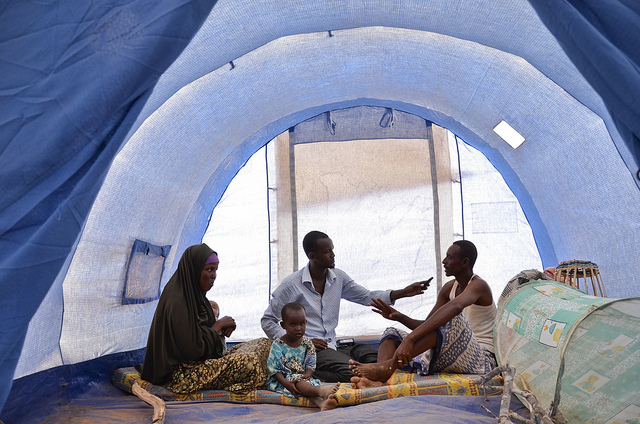
Aden Hassan Tarah, 24, a reporter for Kenya’s Star FM radio station, interviews Ahmed Mohamed, 40, a recent arrival to Dadaab, about his experience being tortured by the Ethiopian military, and about life as a refugee at the Ifo Extention camp in Dadaab, Kenya on August 7, 2011. Photo Credit: Internews Europe
Kenya has garnered praise for becoming one of Sub-Saharan Africa’s fastest growing economies. Now, its government is coming under fire for some recent troubling developments affecting its fourth estate.
According to a report released on Wednesday from the Committee to Protect Journalists (CPJ), a New York City-based watchdog group, Kenya’s press freedom is in free fall.
CPJ notes that throughout much of the country’s history — both under the British and after its independence in 1963 — the media has served the interests of those in power, although some periods have been worse than others. Press freedom after independence was likely at its lowest under President Daniel arap Moi, who was in office from 1978 to 2002. Arap Moi, who saw the country’s transition from de facto single-party state to de jure single-party state, had what The New York Times called a “frosty relationship” with the country’s media. Government-owned media outlets had a monopoly on radio broadcasting until 1992. The broadcasting market eventually opened to privately owned companies, but arap Moi’s administration used other tactics, such as intimidation and harassment, to frighten journalists critical of his government.
Today, press freedom is legally enshrined by the country’s 2010 constitution, but a number of draconian laws implemented within the past few years may put that constitutionally guaranteed protection at risk.
A pair of laws introduced in 2013 also make way for a bulky bureaucracy to limit journalistic freedoms. One, known as the Kenya Information and Communication Amendment Bill, allows for the formation of a government-controlled regulatory body that can lob hefty fines on journalists and media asset owners. The second introduced a media code of conduct to be upheld by the aforementioned regulatory body.
Other troubling developments in 2014 and 2015 included the appearance of a law restricting reporting on events that could possibly undermine terrorism investigations, the application of libel laws on some social media users, and Kenyatta’s own lawsuits against various press outlets. Additionally, a number of politicians have high-stakes holdings in media outlets — or at least have family members who do, like the country’s current president, Uhuru Kenyatta.
Repression tactics are also on the rise, which have led to the rise of one of the country’s biggest hurdles for press freedom: self-censorship.
Intimidation from government officials, death threats, and fears of being followed have pushed some, as John-Allan Namu and Mohammed Ali of KTN told the CPJ, to “become ‘more choosy'” about what topics they report on. As a result, a number of stories are underreported, particularly those related to national security and land, which is a common gift for political patronage.
As troubling as it may be, this downslide in press freedom by no means irreversible. To this end, CPJ offers a number of timely policy recommendations to the Kenyan government, the country’s media council and the outlets themselves.
After all, “Kenya is a role model for economic development in East Africa,” the CPJ writes, “and—given the feisty, independent nature of many of its journalists—[it] could also be a model for freedom of the press.”